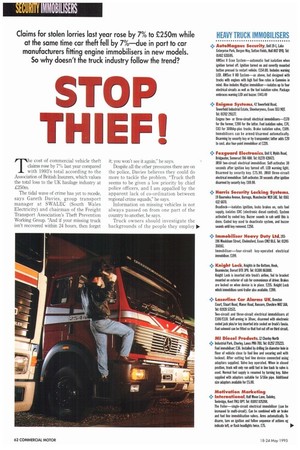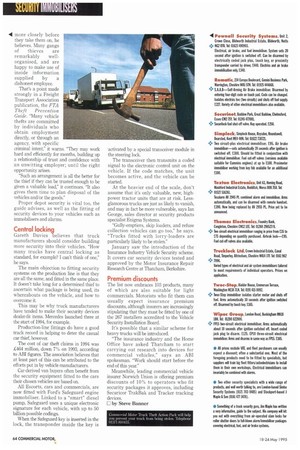STOP THIEF!
Page 64

Page 66

If you've noticed an error in this article please click here to report it so we can fix it.
The cost of commercial vehicle theft claims rose by 7% last year compared with 1993's total according to the Association of British Insurers, which values the total loss to the UK haulage industry at £250m.
The tidal wave of crime has yet to recede, says Gareth Davies. group transport manager at SWALEC (South Wales Electricity) and chairman of the Freight Transport Association's Theft Prevention Working Group. "And if your missing truck isn't recovered within 24 hours, then forget it; you won't see it again," he says.
Despite all the other pressures there are on the police, Davies believes they could do more to tackle the problem. "Truck theft seems to be given a low priority by chief police officers, and I am appalled by the apparent lack of co-ordination between regional crime squads," he says.
Information on missing vehicles is not always passed on from one part of the country to another, he says.
Truck owners should investigate the backgrounds of the people they employ O. • more closely before they take them on, he believes. Many gangs of thieves are remarkably wellorganised, and are happy to make use of inside information supplied by a dishonest employee.
That's a point made strongly in a Freight Transport Association publication, the FTA Theft Prevention Guide. "Many vehicle thefts are committed by individuals who obtain employment directly, or through an agency, with specific criminal intent," it warns. "They may work hard and efficiently for months, building up a relationship of trust and confidence with an unwitting employer; until the right opportunity arises.
"Such an arrangement is all the better for the thief if they can be trusted enough to be given a valuable load," it continues. "It also gives them time to plan disposal of the vehicles and/or the goods."
Proper depot security is vital too, the guide advises, as well as the fitting of security devices to your vehicles such as immobilisers and alarms.
Central locking
Gareth Davies believes that truck manufacturers should consider building more security into their vehicles. "How many trucks have central locking as standard, for example? I can't think of one," he says.
The main objection to fitting security systems on the production line is that they are all the same, and fitted in the same place. It doesn't take long for a determined thief to ascertain what package is being used, its whereabouts on the vehicle, and how to overcome it.
This may be why truck manufacturers have tended to make their security devices dealer-fit items. Mercedes launched three at the start of 1994, for example.
Production-line fittings do have a good track record in helping to deter the casual car thief, however.
The cost of car theft claims in 1994 was 1464 million, down 7% on 1993, according to ART figures. The association believes that at least part of this can be attributed to the efforts put in by vehicle manufacturers.
Car-derived van buyers often benefit from the security equipment fitted to the cars their chosen vehicles are based on.
All Escorts, cars and commercials, are now fitted with Ford's Safeguard engine immobiliser. Linked to a "smart" diesel pump, Safeguard uses a unique electronic signature for each vehicle, with up to 50 billion possible codings.
When the Safeguard key is inserted in the lock, the transponder inside the key is .activated by a special transceiver module in the steering lock.
The transceiver then transmits a coded signal to the electronic control unit on the vehicle. If the code matches, the unit becomes active, and the vehicle can be started.
At the heavier end of the scale, don't assume that it's only valuable, new, highpower tractor units that are at risk. Lessglamorous trucks are just as likely to vanish, and may in fact be more vulnerable, says Ian George, sales director at security products specialist Enigma Systems.
"Gully-emptiers, skip loaders, and refuse collection vehicles can go too," he says. "Trucks fitted with lorry-loaders are particularly likely to be stolen."
January saw the introduction of the Insurance Industry Vehicle Security scheme. It covers car security devices tested and approved by the Motor Insurance Repair Research Centre at Thatcham, Berkshire.
Premium discounts
The list now embraces 103 products, many of which are also suitable for light commercials. Motorists who fit them can usually expect insurance premium discounts, although insurers are increasingly stipulating that they must be fitted by one of the 267 installers accredited to the Vehicle Security Installation Board.
It's possible that a similar scheme for heavy trucks will be introduced.
"The insurance industry and the Home Office have asked Thatcham to start carrying out research into devices for commercial vehicles," says an ABI spokesman. "Work should start before the end of this year."
Meanwhile, leading commercial vehicle insurer Norwich Union is offering premium discounts of 10% to operators who fit security packages it approves, including Securicor TrakBak and Tracker tracking devices.
O by Steve Banner




















































































































































